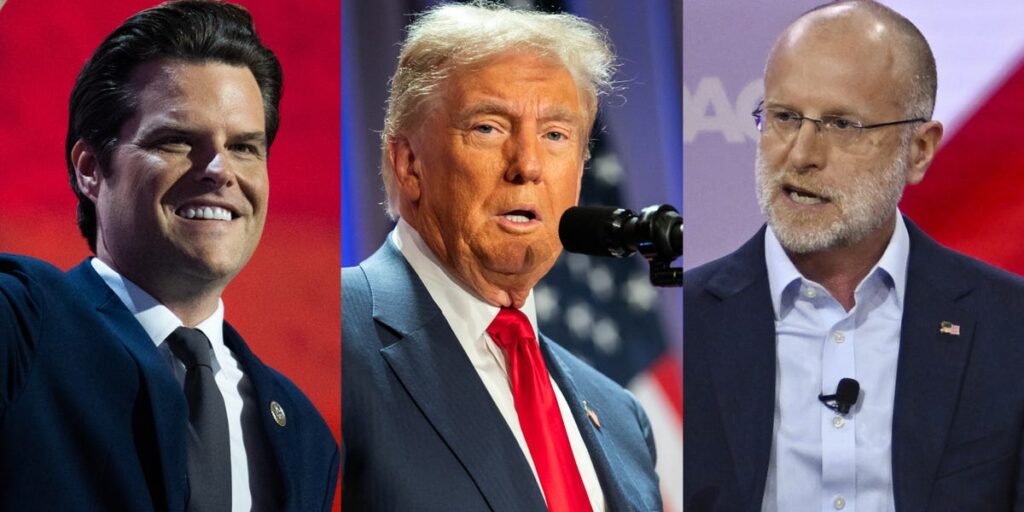- Donald Trump has selected several Big Tech critics for top roles in his second administration.
- Matt Gaetz and JD Vance have advocated for strict antitrust enforcement.
- Like Trump, Elon Musk has regularly railed against tech giants.
Donald Trump has been selecting a steady stream of loyalists he wants to serve in his second administration. A number of his picks have been harsh critics of the Big Tech industry.
Trump’s choices, some of whom are controversial even within the GOP, have not yet been confirmed via floor vote. The president-elect has pushed to skip the process by using his recess appointment power.
Big tech companies like Google, Apple, Meta, Amazon, and Microsoft have drawn the likes of Matt Gaetz, Trump’s pick for attorney general, and Brendan Carr, Trump’s pick to lead the Federal Communications Commission. Trump has repeatedly threatened to escalate matters when he retakes the White House.
In contrast, some Silicon Valley venture capitalists are betting that deregulation in a second Trump term could boost innovation and unleash a startup boom.
Here’s what some of Trump’s picks have said about the tech industry.
Brendan Carr
Carr has called some of the largest tech companies a “censorship cartel.” Carr, who already serves on the FCC, wrote part of the Heritage Foundation’s Project 2025. In his section, Carr wrote that the FCC should lead in eliminating Section 230, the law that shields tech companies from liability for content from third parties.
An ally of Elon Musk, Carry recently wrote a Wall Street Journal op-ed that trashed the FCC for revoking an $885 million award to Musk’s StarLink. It’s likely that Carr would use his new perch to try to find other ways to elevate Starlink and Amazon’s competing Kuiper.
Carr has endorsed banning TikTok, a policy that Trump himself supported during his first administration but has since abandoned. It remains to be seen how the Trump administration will handle a looming deadline for TikTok’s parent company, ByteDance, to cut ties with Chinese ownership.
Matt Gaetz
Trump’s pick for attorney general, former Florida Rep. Matt Gaetz, has for years criticized Big Tech companies.
During a 2021 appearance shortly after Trump was banned from social media platforms following the Capitol riot, Gaetz suggested that Big Tech companies were squashing Americans’ right to free speech.
“The internet’s hall monitors out in Silicon Valley, they think they can suppress us, discourage us,” Gaetz said at the time. “Well, you know what? Silicon Valley can’t cancel this movement, or this rally, or this congressman.”
“We have a Second Amendment in this country, and I think we have an obligation to use it,” he continued.
Gaetz has also advocated for strict antitrust enforcement — a stance that aligns him with the Federal Trade Commission’s current chair, Lina Khan, whose work Gaetz has praised.
While a member of Congress, in 2020 Gaetz tried to pass a package of bills that would have been one of most significant antitrust overhauls in decades.
And during a House Judiciary Committee hearing last year, Gaetz said he was “concerned about the monopoly power of Google,” and encouraged Jonathan Kanter, the assistant attorney general in charge of the DOJ antitrust division, to keep pursuing cases like Google’s.
Elon Musk
Elon Musk, who Trump tapped to lead a new Department of Government Efficiency, has had a tumultuous relationship with Big Tech, as both a leader in the industry and a staunch critic of it.
Musk has frequently used his outsized presence on X, his social media platform, to attack Google.
In July, Musk accused the tech giant of having a “search ban” on Trump because, according to a screenshot Musk posted on X, the search query “president donald” did not include Trump in the top two auto-completed results. He then suggested in the post that Google was engaging in election interference.
A day later, Musk posted on X, “Probably just a coincidence that Alphabet (Google) employees were the top donors to Biden,” alongside a graphic showing political contributions from employees at top companies.
The billionaire also has an ongoing beef with Apple and its CEO Tim Cook.
Earlier this year, Musk threatened to ban all Apple devices from his companies — which include Tesla, SpaceX, xAI, and X — after the iPhone maker announced it had partnered with OpenAI, another one of Musk’s frequent tech targets.
“Apple has no clue what’s actually going on once they hand your data over to OpenAI,” Musk posted at the time, without adding any evidence to back up his claim. “They’re selling you down the river.”
JD Vance
Vice President-elect JD Vance cut his teeth in venture capital, and has long been a proponent for breaking up Big Tech.
Vance said that his experience in Silicon Valley taught him to be weary of Big Tech. He specifically called out Facebook and Apple, saying their business relies on getting users transfixed by screens that are loaded with ads.
“I see the tech sector as we understand it today — and we’re really talking about digital technology, consumer internet, IT, and so forth — those companies I do see as fundamentally parasitic on the broader economy.”
Vance has called for Google to be broken up, and has repeatedly praised FTC Chair Lina Khan. It is now likely Khan will step down, though, according to Bloomberg News, one of Vance’s top aides is heavily involved in selecting her replacement.
Like Trump’s FCC nominee, Vance has advocated for curtailing Section 230.
“It seems preposterous to me to think that 40 or 50 years ago, you would have had your telephone service turned off for having the wrong political views,” Vance said during a 2023 Senate hearing, according to Roll Call. “Now you’re regularly denied access to modern forms of communication for having the wrong political views.”
Read the full article here


